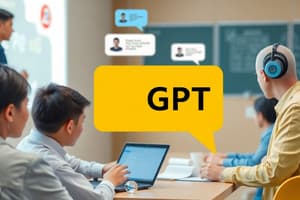Podcast
Questions and Answers
What is one of the best practices for content creation?
What is one of the best practices for content creation?
- Avoid asking for variations
- Include examples of desired tone (correct)
- Provide vague style guidelines
- Request for exclusive formats only
Which of these is crucial when performing technical tasks?
Which of these is crucial when performing technical tasks?
- Avoiding error handling discussions
- Asking only for theoretical explanations
- Specifying programming languages or frameworks (correct)
- Keeping the context irrelevant
What should be clearly defined when conducting research and analysis?
What should be clearly defined when conducting research and analysis?
- The preferred methodology only
- The number of pages needed
- The scope of the research (correct)
- The conclusion before starting
Which of the following is a common pitfall to avoid?
Which of the following is a common pitfall to avoid?
What is an important ethical consideration in using AI tools?
What is an important ethical consideration in using AI tools?
What should you do when creating a prompt assessment checklist?
What should you do when creating a prompt assessment checklist?
Why is it important to verify information independently?
Why is it important to verify information independently?
What is a suggested approach for regular practice with AI prompts?
What is a suggested approach for regular practice with AI prompts?
What is a primary capability of ChatGPT?
What is a primary capability of ChatGPT?
Which best describes the role of clarity in prompt engineering?
Which best describes the role of clarity in prompt engineering?
Which format is recommended for writing tasks in prompt engineering?
Which format is recommended for writing tasks in prompt engineering?
What does role-based prompting involve?
What does role-based prompting involve?
What is the purpose of iterative refinement in prompt engineering?
What is the purpose of iterative refinement in prompt engineering?
Which of the following is NOT a key capability of ChatGPT?
Which of the following is NOT a key capability of ChatGPT?
What should be included when solving a problem with ChatGPT?
What should be included when solving a problem with ChatGPT?
Why is it important to break complex requests into steps in prompt engineering?
Why is it important to break complex requests into steps in prompt engineering?
Flashcards
ChatGPT
ChatGPT
A large language model trained by OpenAI that processes and generates human-like text.
Prompt Engineering
Prompt Engineering
The art of crafting effective instructions for AI models like ChatGPT to get the best results.
Clear & Specific Prompts
Clear & Specific Prompts
Giving ChatGPT precise instructions by stating the goal, providing context, and specifying the desired format.
Logical Prompt Structure
Logical Prompt Structure
Signup and view all the flashcards
Role-Based Prompting
Role-Based Prompting
Signup and view all the flashcards
Chain-of-Thought Prompting
Chain-of-Thought Prompting
Signup and view all the flashcards
Iterative Refinement
Iterative Refinement
Signup and view all the flashcards
Prompt Templates
Prompt Templates
Signup and view all the flashcards
Content Creation Best Practice
Content Creation Best Practice
Signup and view all the flashcards
Technical Task Best Practice
Technical Task Best Practice
Signup and view all the flashcards
Research & Analysis Best Practice
Research & Analysis Best Practice
Signup and view all the flashcards
Accuracy Verification
Accuracy Verification
Signup and view all the flashcards
Privacy Considerations
Privacy Considerations
Signup and view all the flashcards
Ethical Use
Ethical Use
Signup and view all the flashcards
Prompt Quality Checklist
Prompt Quality Checklist
Signup and view all the flashcards
Overreliance on Outputs
Overreliance on Outputs
Signup and view all the flashcards
Study Notes
Mastering ChatGPT: A Comprehensive Learning Module
- ChatGPT is a Large Language Model (LLM) trained by OpenAI
- It processes and generates human-like text
- It understands context and maintains conversations
- It's available in free and paid versions (Plus)
Learning Objectives
- Write effective prompts for optimal responses
- Use advanced ChatGPT features
- Implement best practices for different use cases
- Understand ChatGPT's limitations and potential risks
Module 1: Understanding ChatGPT Basics
- ChatGPT is a large language model
- Trained by OpenAI
- Processes and generates human-like text
- Understands context and maintains conversations
- Available in free and paid versions
Key Capabilities
- Writing and editing
- Analysis and explanation
- Code generation and debugging
- Creative content generation
- Translation and language assistance
- Problem-solving and brainstorming
Module 2: Prompt Engineering Fundamentals
- Basic Principles:
- Be clear and specific (state objective clearly, provide necessary context, specify desired format or style)
- Use the right format (structure prompts logically, break complex requests into steps, include relevant examples)
- Prompt Templates:
- For writing tasks: Write a [document type] about [topic] for [audience]. Key points to include:[Point 1], [Point 2]. Tone: [formal/casual/technical]. Length: [specify length].
- For analysis tasks: Analyze [subject] considering: [Aspect 1],[Aspect 2],[Aspect 3]. Provide specific examples and explanations.
- For problem-solving: Help me solve this problem: [describe problem]. Context:[relevant background]. Constraints:[list any limitations]. Desired outcome:[what success looks like].
Module 3: Advanced Techniques
- Role-Based Prompting: Assign specific roles to ChatGPT (e.g., "Act as a [role] and help me with [task]"). Roles can include: editor, tutor, expert in specific field.
- Chain-of-Thought Prompting: Break down complex problems, ask for step-by-step explanations, and build on previous responses.
- Iterative Refinement: Start with a basic prompt, review the response, refine the prompt, and repeat until the desired output is achieved.
Module 4: Best Practices by Use Case
- Content Creation: Provide clear style guidelines, include examples of desired tone, request specific formats, and ask for variations.
- Technical Tasks: Share relevant technical context, specify programming language/framework, ask for explanations with code, and request error handling.
- Research & Analysis: Define scope clearly, ask for multiple perspectives, request citations when needed, and verify information independently.
Module 5: Safety and Limitations
- Important Considerations: Verify factual information, cross-reference important data, be aware of knowledge cutoff dates, avoid sharing sensitive information, don't input confidential data, be cautious with personal details, follow OpenAl's usage policies, and respect intellectual property.
Common Pitfalls to Avoid
- Overreliance on outputs
- Assuming all information is accurate
- Using for critical decisions without verification
- Sharing sensitive information
- Unclear or vague prompts
Practice Exercises
- Exercise 1: Basic Prompting (Write three different prompts for the same task using different approaches.)
- Exercise 2: Refinement (Take a basic prompt and improve it using the techniques learned.)
- Exercise 3: Use Case Specific (Create prompts for three different professional scenarios.)
Assessment Checklist
- Prompt Quality: Clear objective, specific context, appropriate format, necessary constraints
- Output Evaluation: Meets requirements, appropriate level of detail, correct format, useful for intended purpose
Additional Resources
- OpenAI's ChatGPT documentation
- Prompt engineering guides
- Best practices updates
- Community forums and discussions
Regular Practice Tips
- Start with simple tasks
- Gradually increase complexity
- Experiment with different approaches
- Document successful prompts
- Learn from unsuccessful attempts
Studying That Suits You
Use AI to generate personalized quizzes and flashcards to suit your learning preferences.




